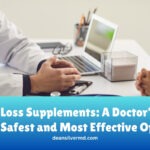When embarking on a weight loss journey, many individuals look for additional help beyond traditional diet and exercise. Weight loss supplements have gained immense popularity, often marketed as quick fixes or miraculous solutions. However, understanding the landscape of weight loss supplements, from their mechanisms to their safety and effectiveness, is crucial in making … [Read more...] about Weight Loss Supplements: A Doctor’s Guide to the Safest and Most Effective Options
Weight Loss
Doctor-Recommended Supplements for Safe and Effective Weight Loss
Losing weight can often feel like a daunting challenge. Many individuals struggle with the fluctuating scales, managing their diets, and finding the right motivation to stay on track. While a combination of healthy eating habits and regular exercise remains the cornerstone of effective weight management, supplements can provide an additional layer of support for many. With the … [Read more...] about Doctor-Recommended Supplements for Safe and Effective Weight Loss
Are Weight Loss Supplements Worth It? What Medical Research Shows
In today's health-conscious society, the weight loss supplement industry has burgeoned into a multi-billion dollar market, promising quick fixes and easy solutions for those struggling with excess weight. With a plethora of products available, from pills and powders to teas and shakes, it can be tempting to seek these shortcuts for weight loss. However, the crucial question … [Read more...] about Are Weight Loss Supplements Worth It? What Medical Research Shows
How to Use Weight Loss Supplements Safely: Doctor-Approved Guidelines
In an age where obesity ranks as a serious health concern, the market for weight loss supplements has burgeoned. Many individuals are drawn to the allure of these products, hoping to shed excess pounds with minimal effort. However, the journey to weight loss through supplements is fraught with potential pitfalls. Understanding how to use these products safely is essential for … [Read more...] about How to Use Weight Loss Supplements Safely: Doctor-Approved Guidelines
Supplements for Fat Loss: Medical Insights for Effective Results
The pursuit of fat loss is a shared goal for many, fueled by aspirations of improved health, enhanced aesthetics, and greater confidence. In recent years, the weight loss industry has witnessed the rise of various supplements that promise magic solutions to shed those extra pounds quickly. However, the reality is far more complex, as not all supplements are created equal. To … [Read more...] about Supplements for Fat Loss: Medical Insights for Effective Results





